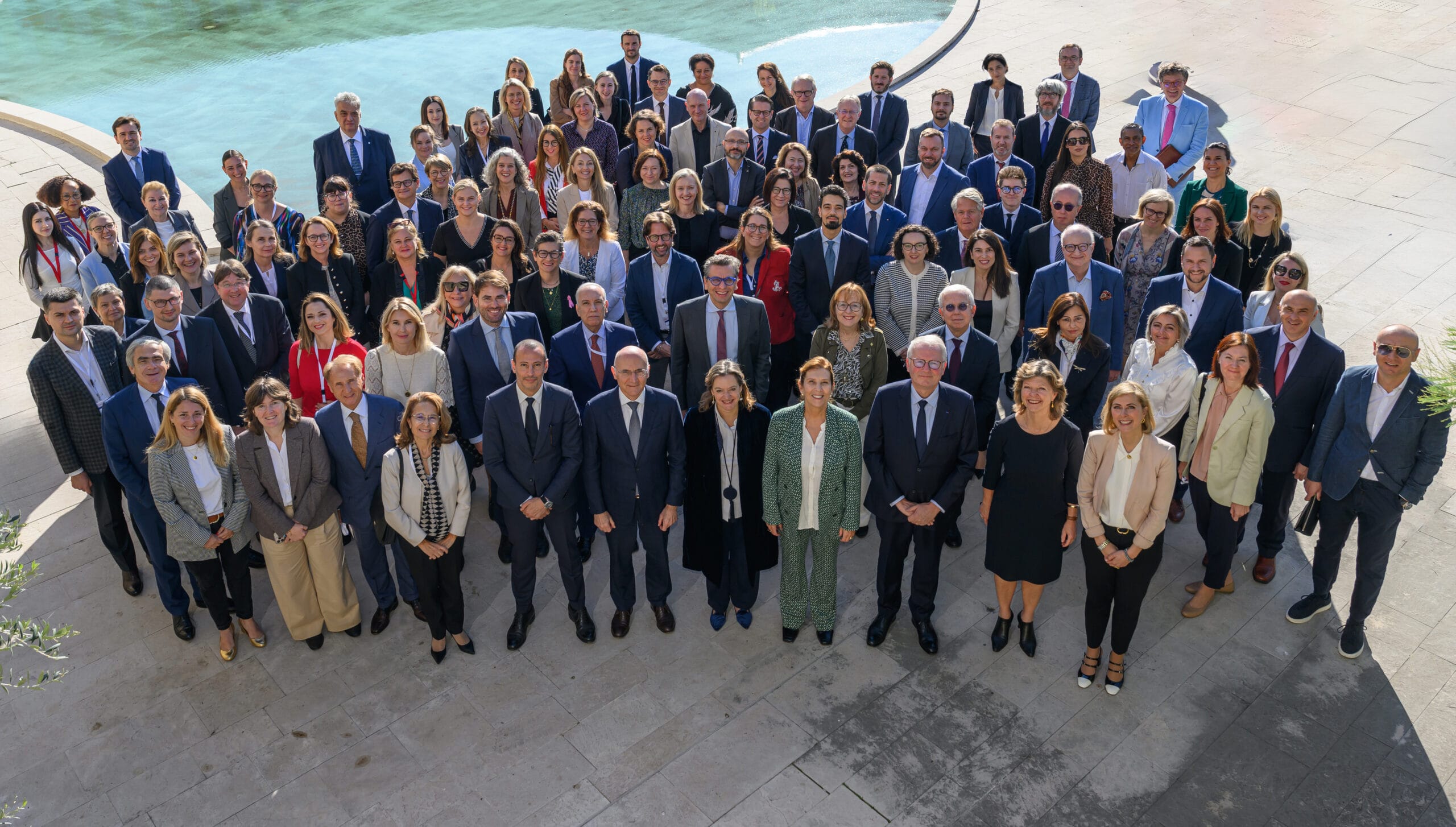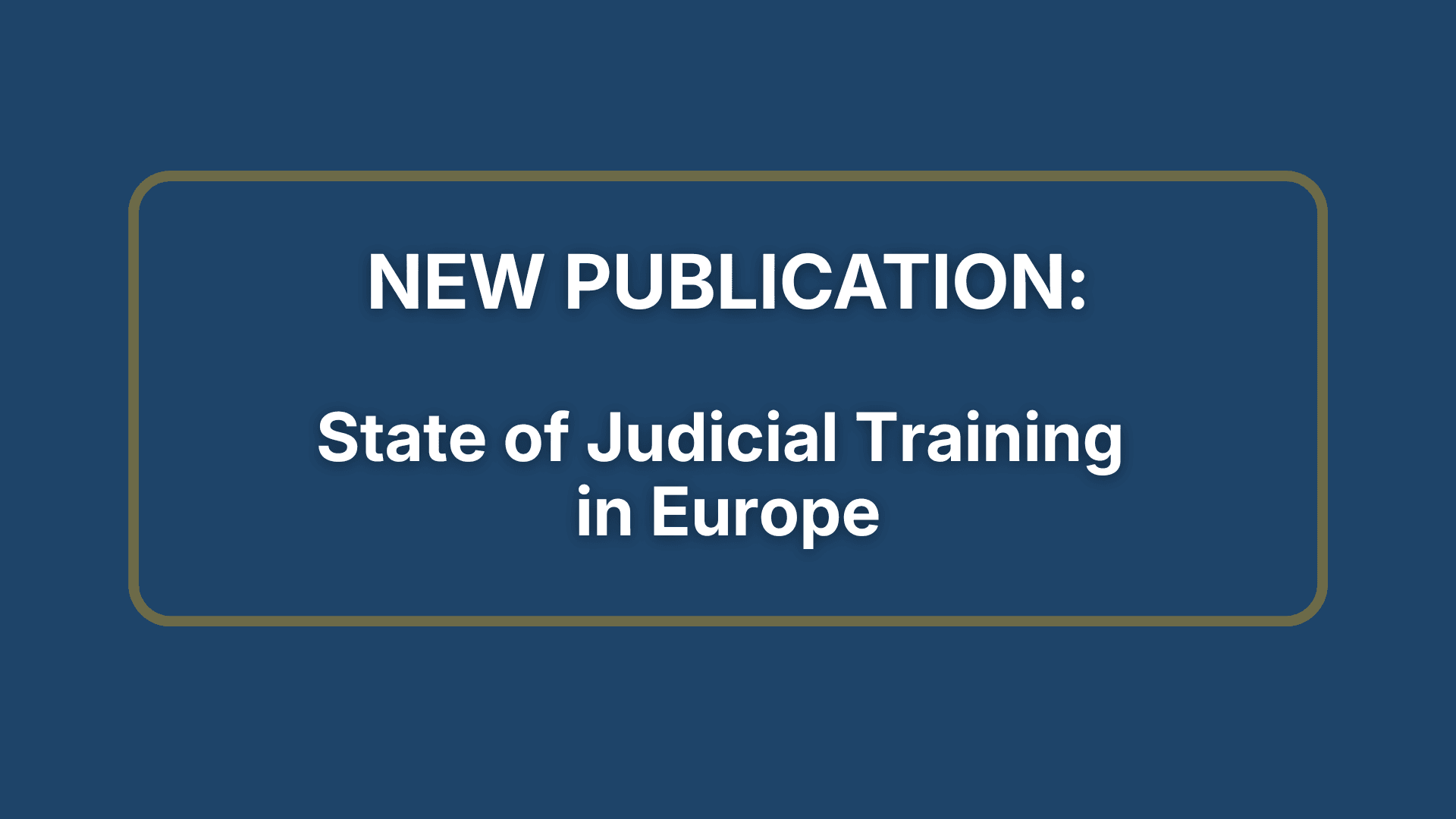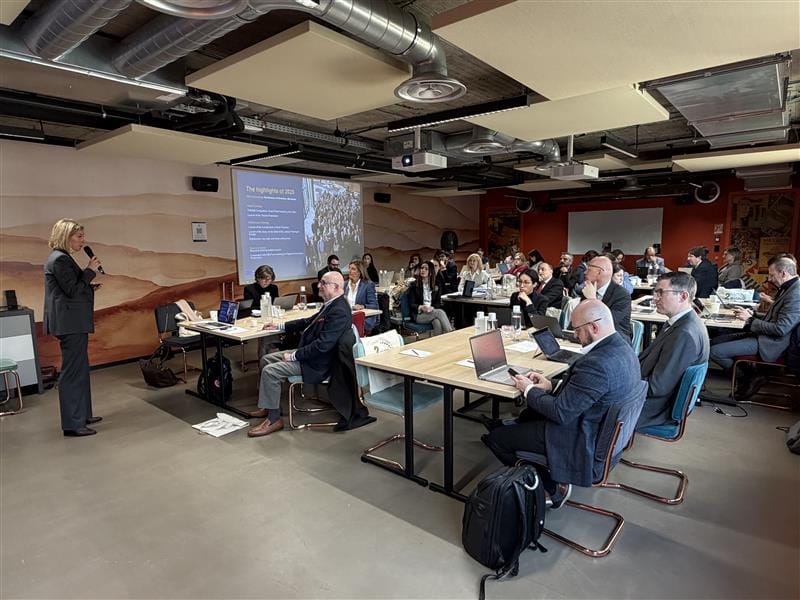On 14–15 October, the European Judicial Training Network marked its 25th anniversary, organised in conjunction with the annual Conference of Directors and hosted by the Ecole Nationale de la Magistrature (ENM) in Bordeaux, France.
Bordeaux holds particular significance for EJTN, as it was in this city that the Network was established in 2000, when representatives of 16 judicial training institutions gathered to sign the Bordeaux Charter. This founding act laid out the principles, objectives, and framework for cooperation in the field of judicial training at the European level.
Since then, EJTN has been at the forefront of promoting a shared judicial culture among the training institutions of the 27 EU Member States. Over the past 25 years, the Network – now consisting of 35 members, 5 associate members and 17 observers – has contributed to establishing common standards, sharing best practices, and fostering cooperation across European borders, among other achievements. You can learn more about EJTN’s key historic milestones here.
This anniversary event was both a celebration and a moment of reflection. Testimonies from key stakeholders underlined EJTN’s central role as a judicial training provider, while the conference agenda focused on forward-looking themes of strategic importance for the future of European justice.
Shaping the future of justice in Europe: EJTN 2030 and beyond
The strategic reflection on the future of European judicial training was a key focus at the event. Three key themes – security, transformation and democratic resilience – guided the conversations, and they will form the basis of an ambitious EJTN strategic plan for 2028-2034, which will be focused on contemporary challenges and the consolidation of the European Area of Justice. These themes were explored through presentations, workshops, speeches and interactive educational tools provided by EJTN Members.
Security: strengthening the fight against cross-border organised crime
Transnational organised crime requires transnational solutions. EJTN continues to play a key role in equipping justice practitioners with the knowledge and skills needed to handle complex cross-border cases, including enhancing the efficiency and consistency of Europe’s judicial response to crime. Training activities will continue to cover cooperation tools such as the European Arrest Warrant and Joint Investigation Teams, as well as promote the case law of the Court of Justice of the European Union and support the consistent interpretation and application of EU criminal law across all Member States.
Transformation: embracing digitalisation and Artificial Intelligence
Digital transformation reshapes all aspects of society, including European justice systems. From case management software to the use of AI in courtrooms, new technologies offer both opportunities and challenges. Through highly specialised training activities, EJTN continues to prepare justice practitioners for the digitalisation of justice, so that they can use the new tools effectively but also critically. A particular focus is placed on the ethical dimension and ensuring that digital innovation supports fundamental rights instead of undermining them.
Democratic resilience: defending and upholding the Rule of Law
In today’s complex environment, judicial independence, integrity and mutual trust between national systems are more important than ever. Together with its members and partners, EJTN continues to reinforce the Rule of Law through training activities that foster dialogue, thus building a shared sense of professional judicial identity rooted in European values of democracy, justice and fundamental rights. Particular focus is placed on judicial ethics, the protection of fundamental rights, and the practical challenges faced by justice practitioners in upholding the Rule of Law in their daily work.
Reflections on EJTN’s legacy and future
High-level representatives from European and French institutions as well as national judicial training institutions contributed their much-valued perspectives on the role of EJTN in shaping the future of justice across the EU. Their contributions will help frame the strategic priorities discussed during the event, and they also reaffirm the importance of a coordinated approach to judicial training.
We would like to thank the European Commission, the Court of Justice of the European Union, the European Public Prosecutor’s Office, Eurojust, the European Court of Human Rights, the European Network of Councils of the Judiciary (ENCJ) and the European Association of Judges for Mediation (GEMME) for their valuable presence and contributions.
Moreover, we want to thank the honoured guests and speakers who joined us for this special event to share their insights on the state of European justice: Nathalie Roret; Director of Ecole Nationale de la Magistrature; Christophe Soulard, First President of the Court of Cassation, France; Rémy Heitz, Chief Prosecutor at the Court of Cassation, France; Julie Couturier, President of the National Council of Bars; Lorenzo Salazar, Honorary Magistrate and Senior Adviser; Isabelle Jégouzo; Director of the French Anti-Corruption Agency; Peter Csonka, Director, DG JUST, European Commission; Massimiliano Calaresu, DG COMP, European Commission; Andrés Ritter, Deputy European Prosecutor, EPPO; Mathieu Fohlen, Seconded Magistrate, AGRASC, France; Jan MacLean, Eurojust; Soraya Amrani Mekki, Professor at the University of Paris Nanterre; Sanja Jovicic, European Union Agency for Fundamental Rights (FRA); Veronique Malbec, Member of the Constitutional Council, France; Fernando Vaz Ventura, Director of the Centre for Judicial Studies, Portugal; Wojciech Postulski, DG JUST, European Commission; Margreet Blaisse, Chair of the ETJN Steering Committee; Ramona Strugariaru, Director of NIJ Moldova; Anne-Sophie Beyssac, Director of ENG, France; Sebastian Biancheri, Judge of the European Court of Human Rights, as well as President of the CJEU Koen Lenaerts and European Commissioner Michael McGrath who delivered video messages. A warm thank you also goes to the moderators of the various sessions.
Ingrid Derveaux, the EJTN Secretary General, reaffirmed the Network’s vital mission in shaping Europe’s judiciary:
“For 25 years, EJTN has united Europe’s judicial training institutions around a common objective: strengthening justice through cooperation, knowledge, and shared values.
Today, as we look forward to EJTN’s next strategic period and beyond, our mission remains more vital than ever. By equipping Europe’s judges, prosecutors, and court staff with the tools and knowledge they need to face the digital transformation of justice and the rise in the use of Artificial Intelligence while upholding fundamental rights and the Rule of Law in an increasingly interconnected world, we reaffirm our commitment to excellence and innovation in judicial training.
Together with our members, associate members, observers and partners, I am confident that we will continue to shape the future of justice and meaningfully contribute to a strong, independent, and forward-looking European judiciary.”
Nathalie Roret, Director of the Ecole Nationale de la Magistrature, highlighted in her opening speech:
“Today, we celebrate the dynamism of a vibrant organisation dedicated to building the European Union’s Area of freedom, security and justice. An organisation that has successfully found its role and continually reinvented it.
Training remains an essential element for disseminating knowledge of European law and fostering the adoption of its operational tools, such as the European Arrest Warrant, which EJTN has greatly facilitated in the courts. Beyond European law alone, the Network, with the active support of the European Commission, has become a forum for cross-examination between generations of future magistrates through the THEMIS and AIAKOS programmes, as well as for magistrates at all stages of their careers, who have been able to deepen their understanding of the European dimension of their duties.
This direct influence of the Network on justice practitioners has been complemented by in-depth exchanges between schools on innovations related to training itself: new teaching methods, digital media and statutory discussions. This has resulted in a genuine dynamic of collective progress, possible through the links established between national training institutions.”
EU Commissioner for Democracy, Justice, the Rule of Law and Consumer Protection Michael McGrath highlighted in his video contribution:
“Throughout these years, you have tirelessly supported and delivered judicial training in support of the EU Area of Justice. Today’s Conference is rightly dedicated to this celebration while looking ahead to the future of judicial training.
Digitalisation and AI offer significant new opportunities to deliver justice that is faster, more efficient and more accessible while also contributing to Europe’s growth and competitiveness. The forthcoming Judicial Training Strategy will strongly support this transformation alongside the Digital Justice Strategy, placing training at its heart.
The digital transformation must empower justice professionals and enhance their capabilities in the digital realm, equipping them with new skills, knowledge and awareness. IT and AI literacy training should become a core part of judicial training, tailored to specific roles and responsibilities. Awareness is equally important. Digitalisation must not be seen as a burden but as a tool to improve justice delivery.”
President of the Court of Justice of the European Union, Koen Lenaerts noted in his video message:
“The Court of Justice of the European Union and the European Judicial Training Network have long been close allies in promoting trust among judges and prosecutors in the Member States and enhance knowledge of EU law and procedures. […] This anniversary, however, also offers a momentum for looking into the future, in particular how to tackle some of the most pressing challenges our judicial offices face in Europe in the 21st century.
For example, incorporating digitalisation more intensely in our processes without undermining the essence of our judicial mission; ensuring the effective fight against ever more sophisticated forms of crime; promoting sustainable development without undermining economic prosperity; managing effectively waves of immigration fuelled by international conflicts, climate change and economic downturns, while respecting human dignity.
And of course, properly assuming our role as ultimate bulwarks against threats on fundamental rights, democracy and the rule of law, which are centre stage in our common constitutional traditions.”
Peter Csonka, Head of Unit at the Directorate-General for Justice and Consumers (European Commission) highlighted the role of EJTN for judicial cooperation:
“Since its foundation, the European Judicial Training Network has been at the heart of judicial cooperation in Europe, promoting mutual trust, developing a shared legal culture and delivering high-quality training to tens of thousands of judges, prosecutors and court staff across the continent.
Through its innovative exchange programmes, high-quality seminars on issues related to EU law and policies, as well as its commitment to lifelong training, EJTN has built strong bridges between national judicial systems and strengthened the European Area of Justice.”
Looking to the future
The next EJTN General Assembly will take place in Cyprus on 18-19 June, hosted under the future Cypriot Presidency of the Council of the European Union, and the next EJTN Conference of Directors will take place in Ireland in autumn 2026.
***
EJTN wants to thank the Director of the Ecole Nationale de la Magistrature, Nathalie Roret, Haffide Boulakras, Emmanuelle Laudic-Baron and the ENM team for their professionalism and dedication in the organisation and delivery of this year’s Conference of Directors and the special anniversary event.




